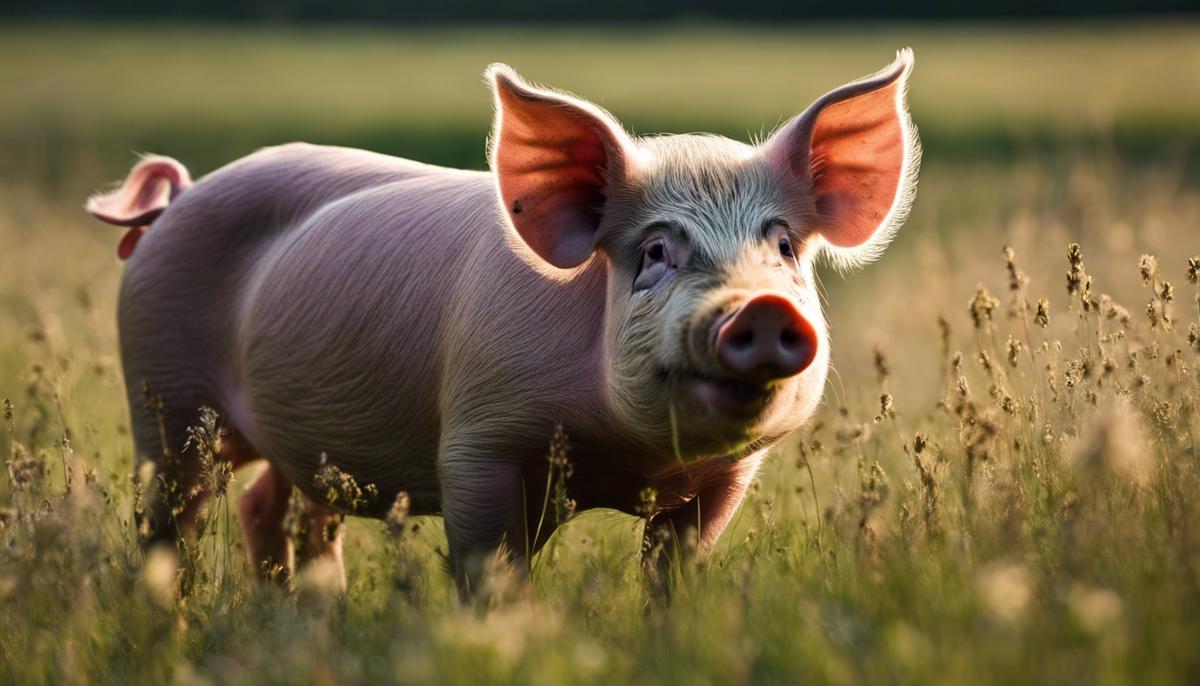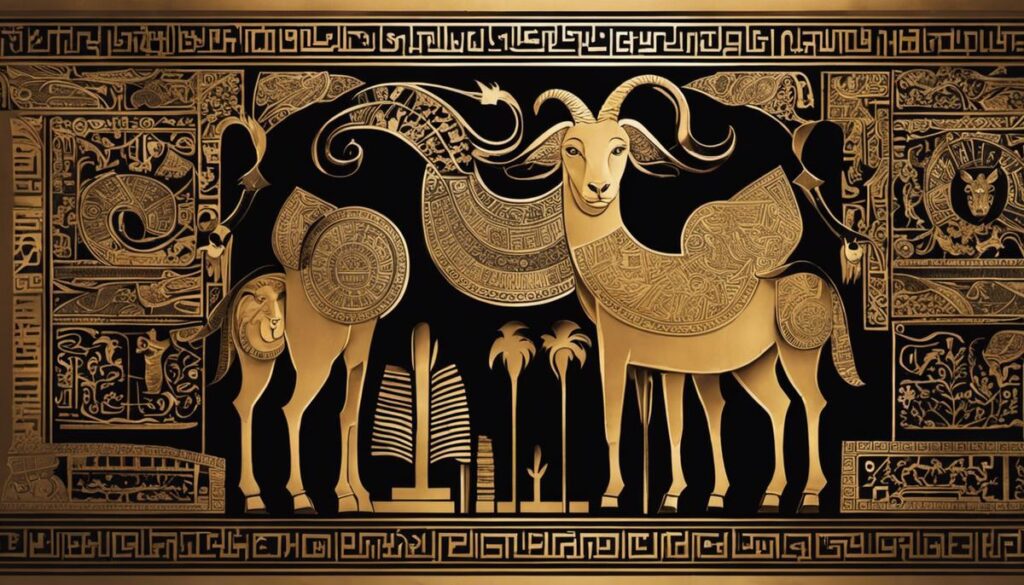Throughout religious texts, dreams have continued to mystify and intrigue believers, leading to myriad interpretations and theories regarding their possible meanings. Among such narratives, the appearance of pigs in dreams is particularly worth investigating. Not least due to the noteworthy status of this animal in the Bible – usually considered as unclean and if often prohibited. This cultural and historical stance raises several questions about the representation and connotations attached to pigs appearing in dreams. By analysing the symbolism of pigs in dream psychology, the biblical view of dreams, and pig-specific interpretations in a biblical framework, we aim to unearth a more profound understanding of this common dream symbol within a biblical context.
Historical Context of Pigs in the Bible
The Pig in Biblical Narratives and Jewish Tradition: A Detailed Examination
It’s hardly possible to overstate the fascinating role of various creatures within the tapestry of biblical narratives and Jewish tradition. Among the plethora of animals mentioned, the pig often stands out due to its distinct and rather complicated existence within these traditions.
In the Bible, references to the pig can be found in both, the Old and New Testament. However, in the Jewish canon, the pig enjoys a somewhat paradoxical reputation. Despite its frequent mention, it is considered ‘unclean’ per Jewish dietary laws or Kashrut, outlined in Leviticus 11:7 and Deuteronomy 14:8. The pig is deemed inedible due to its unique characteristic of possessing one kosher sign (cloven hoof), but lacking the other (chewing the cud). This detail from the sacred scriptures has directed the eating habits of generations of faithful adherents.
In addition to dietary laws, the pig has been thrust into the role of a symbol within Jewish tradition. It has often been linked with circumstances of oppression and anti-Judaism. For instance, during the Greek and Roman occupations, sacrifice or consumption of the pig was imposed on Jews as a method of forced assimilation, a historical fact that further deepened the disdain for this creature.
On the other hand, the pig appears in the New Testament in some remarkable narratives. Two of the most prominent are the Prodigal Son story (Luke 15:11–32), and the Miracle of the Gadarene Swine (Mark 5:1-20, Matthew 8:28-34, and Luke 8:26-39). In both instances, pigs serve as powerful metaphors – representing sin and spiritual restoration, respectively.
In these narratives, the pig’s unclean status is a sharp contrast to the sanctity of human beings, a vivid representation of a humbling or transformative experience. These stories are undeniably impactful and deeply symbolic, their interpretation providing ample ground for theological study.
From an anthropological and historical perspective, the pig’s significance to both, ancient and modern Jewish culture, is deeply rooted. Food, in all cultures, is more than sustenance; it is a marker of identity, tradition, and faith. The abstention from pork serves not merely as obedience to religious law, but also as a potent signal of distinctiveness.
In conclusion, though the pig does not fare well within biblical narratives and Jewish tradition, its symbolic representation helps us better understand the socio-cultural complexities that underpin biblical interpretation, adherence to faith, and the transcending power of religious narrative. It offers a unique lens to view how identity, faith, and tradition can be inextricable, each playing essential roles in shaping collective consciousness.

Symbolism of Pigs in Dreams
Taking this accumulated knowledge into account, let’s approach the topic of pigs in dreams from a psychological perspective. Existing outside the religious texts and narratives, pigs in dreams could represent numerous symbolic cues.
In the realm of psychoanalysis, Carl Jung has proposed the concept of ‘collective unconscious,’ which posits that certain symbols hold identical meanings for cultures worldwide. Pigs, for instance, are frequently associated with greed and stubbornness, possibly due to their behavior and physical characteristics. Therefore, encountering a pig in a dream might be embodying these characteristics. From a Jungian standpoint, this could indicate the dreamer’s internal conflict with their own greed or obstinacy.
Moreover, culturally, pigs are often seen as symbols of abundance and fertility. Their propensity to produce large litters and their part in farm life places them in this position. Hence, witnessing the image of a pig in a dream could potentially indicate a period of prosperity or personal growth approaching the dreamer’s life. As subjective as dream interpretation tends to be, one must always regard the cultural context and personal circumstances of the dreamer to decipher its accurate meaning.
Sigmund Freud, another prominent figure in psychology, touched upon dream symbolism in his groundbreaking work “The Interpretation of Dreams.” In Freud’s view – deriving heavily from his psychosexual development theory – the pig can symbolize primal desires and instincts, especially those that society might deem as ‘lower’ or ‘base.’ Dreams involving pigs, in this context, could signify the dreamer wrestling with their raw, potentially unrefined urges or behaviors.
Furthermore, research from the neuroscience field studying Rapid Eye Movement (REM) sleep, where most of our dreaming occurs, has indicated that dream content can often serve as a reflection of our waking concerns, anxieties, or routines. Pigs appearing in dreams, under this theory, may represent persistent worries about gluttony, materialism, or durability.
To conclude, pigs in dreams might be viewed as a vessel for a myriad of symbolic interpretations, with potential meanings ranging from indicators of vice or virtue, markers of prosperity, or emblematic representations of primitive instincts. These interpretations rely heavily on the psychological theories presented by icons like Freud and Jung, as well as our current understanding of neuroscience. As always in the realm of dream interpretation, these symbols’ meanings remain subjective: intrinsically linked to the dreamer’s psyche and pertinent waking-life experiences.

Dreams in Biblical exploration
Decoding Biblical Dream Interpretation: An Underlying Link to Christian Theology
Dreams play a significant role in human psychological life and can serve as windows into our subconscious—this is universally acknowledged, from Carl Jung’s concept of collective unconscious to Sigmund Freud’s perspectives on dream symbolism. This all-encompassing societal fascination with dreams isn’t a contemporary phenomenon, however. The valorization of dreams and interpretations therein is deeply embedded in the annals of human history, and is prominently featured in various religious scriptures, with the Bible being no exception.
Biblical narratives often highlight the importance of dreams as divine messages or prophecies. From ancient patriarchs like Abraham and Joseph to rulers like Pharaoh and Nebuchadnezzar, dreams exhibited an inherent ability to relay divine will and warnings. The biblical approach embraces dreams as a divine conduit—an ethereal portal through which God connects with humankind.
Interestingly, Christian thought engages with a key distinction between dreams of divine origin and dreams with mundane or evil origins. The former type, touted as revelatory dreams, are perceived as timely dispatches from God, loaded with prophetic or directive import. The latter, on the other hand, are generally considered reflections of human anxieties, primal desires, or even demonic influences.
In Christian theology, dreams stand as a testament to the omnipotence and omniscience of God, reflecting His ability to permeate the natural laws of time and space. The manifestation of Divine messages in dreams exposes the fragile boundary between temporal reality and the celestial plane, thus underscoring God’s pervasive presence.
Revelatory dreams often play pivotal roles in shaping the narrative arch of biblical stories. For instance, Joseph’s ability to interpret dreams essentially saved Egypt from a severe famine and set him on a path of influence and power. In the New Testament, God-mediated dreams guided the Wise Men and Joseph (the husband of Mary), proving crucial in the survival and life trajectory of Jesus Christ.
Complementing dreams, a web of symbolic elements is threaded throughout Biblical narratives. Dreams in the Bible usually communicate their divine message through symbols – objects, animals or circumstances that carry meaning beyond their literal interpretation. These examples of biblical symbology, from the seven fat and lean cows in Pharaoh’s dream to the colossal statue in Nebuchadnezzar’s, act as illustrative vessels that encapsulate divine messages.
Interpretation of these dream symbols is deemed an exercise of discerning divine intentions, demanding profound spiritual wisdom and insight. Biblical dream interpretation isn’t an arbitrary act—it’s akin to deciphering a heaven-sent code or unwinding a celestial cipher.
To complete the circle, dream interpretation extends the impact of dreams beyond personal revelations to derive communal values and norms. Symbolic interpretations provide moral and ethical guidance, contributing to societal harmony and spiritual growth. They serve to affirm faith, uphold religious law and delineate distinctive identities, as evidenced by widely held interpretations of pigs symbolizing vices or virtues, prosperity, or primitive instincts.
Ultimately, both dreams and their interpretations function as pivotal cogs in the vast machinery of biblical narrative and Christian theology. The critical role of dreams underscores the human quest for understanding, reinforcing the belief in divine intervention and the resultant power to shape the collective conscience of societies. With rigorous analysis and careful consideration, these complex layers of symbolism facilitate a deeper appreciation for the profound blend of human psychology and divine interaction found within these age-old narratives.

The Biblical Meaning of Pigs in Dreams
On the Biblical Interpretations When a Pig Appears in a Dream: Insights into Divine Dream Patterns and Their Implications
Delineating biblical insights becomes intriguing when embarked through the lens of dreams, especially when a seemingly common creature like a pig features significantly. It’s a nuanced task, deeply root into broader theological constructs and notions of symbolism.
A crucial aspect of the Christian faith includes interpreting dreams as divine messages or prophetic tools, a compelling testament to the omnipresence and omniscience of God. While dreams have held sway across various cultures and religions, Christianity holds a unique view that distinguishes between dreams of divine origin and those with mundane or even evil roots.
In essence, when pigs appear in dreams according to a Christian perspective, they are not viewed as ordinary nocturnal brain activity. Instead, they are treated as potential messages from God, gently nudging the dreamer towards a moral action or spiritual truth.
Dreams can play a pivotal role in shaping biblical narratives, and pigs in dreams can carry significant symbolic connotations for the dreamer. While individual interpretation forms a basis for understanding, there is a communal pattern that can reveal shared values and norms. Analysis of these patterns forms a crucial part of biblical hermeneutics and the discernment of divine intentions, forging a path into the realms of spirituality and morality that have long shaped collective consciousness.
Moreover, the interpretation of biblical dream symbols has far-reaching implications beyond the immediate narrative. Encoding profound spiritual truths, these symbols often reflect societal norms, rendering dreams an effective tool in directing collective morality. Hence, understanding the biblical interpretation of a pig appearing in a dream is not just an individual spiritual exercise but one that bears influence on the broader societal ethos, shaping communal values and norms.
In the end, a pig’s appearance in a dream can provide a key into the sublime intricacy of the human mind as it interacts with divine signals. It blurs the line between divine and human realms, revealing an intimate fusion of psychological and divine impressions. This fascinating confluence opens up new avenues for the discourse about the interface of human psychology, divine interaction, and biblical interpretation, thus adding a compelling layer to our understanding of dream symbolism.
Finally, a study into the biblical interpretation when a pig appears in a dream is no mere academic exercise. It’s a journey into the understanding of an ancient, divine communication system that, if correctly interpreted, could profoundly influence the course of our lives, societies, and beyond.

As we explore the intersection of pigs and dreams in the Bible, we must not forget the multifaceted nature of dream symbolism, with individual and cultural interpretations playing a key role. The discussion unraveled the complexities of biblical, historical, and psychological perspectives and emphasized the need for a discerning approach when interpreting dream symbolism. The dreamer’s emotion and the specific scenario within the dream itself are incredibly critical. Decoding pigs in dreams through a biblical lens is not simply about perceiving them as impure or ungodly symbols. Instead, it’s about drawing from a complex blend of cultural narratives, psychological insights, and scriptural guidance to better understand this unique dream scenario within a biblical framework.







